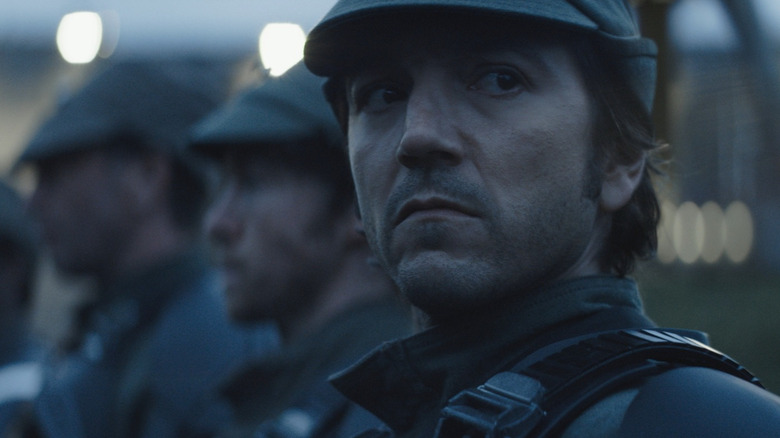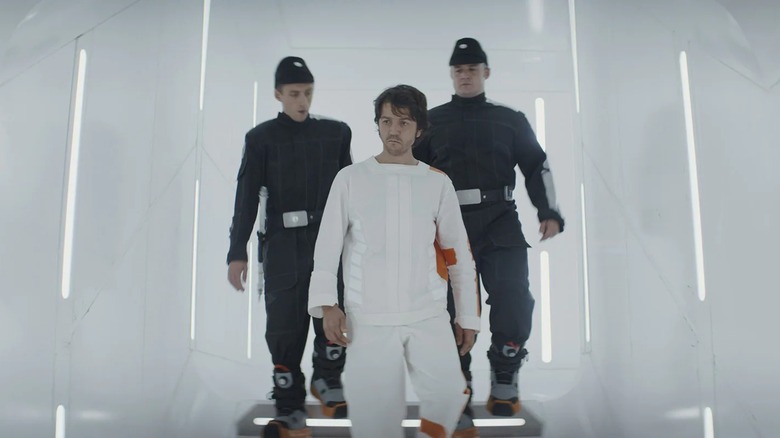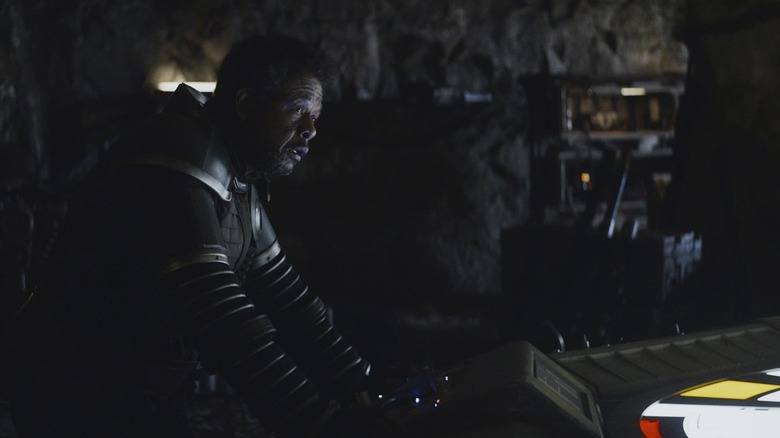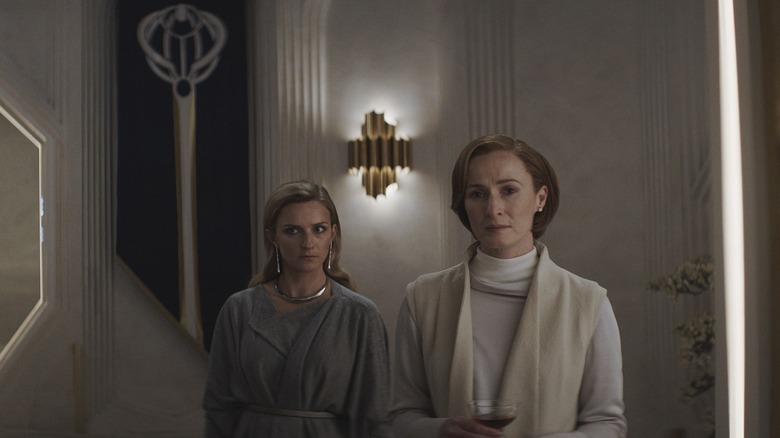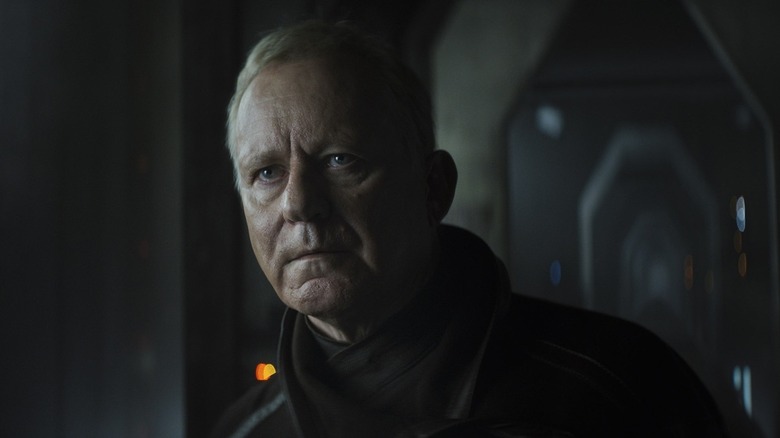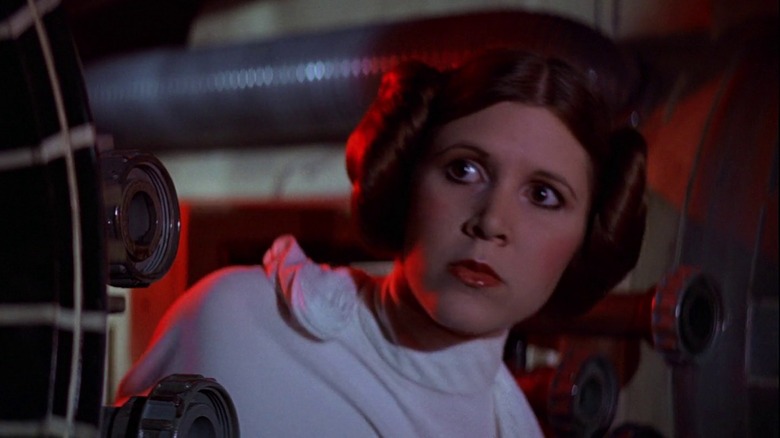Andor Asks A Big Question: Can You Separate Star Wars From Disney's Corporate Identity?
Season 1 of "Andor" came to a thrilling end this week. For many jaded fans of "Star Wars," this series was just the kind of reinvigorating spark the franchise has needed since it found itself in the middle of an unfortunate identity crisis. Showrunner Tony Gilroy (who also co-wrote "Rogue One: A Star Wars Story") has taken Lucasfilm's blank check and turned it into something unique for the classic pop culture franchise: a character study of a younger and disillusioned Cassian Andor (Diego Luna) finding his purpose in the humble beginnings of the Rebel Alliance.
One of the more unexpected qualities of the series is its specific interest in fleshing out the politics of the "Star Wars" galaxy. "Andor" deliberately pulls our focus away from the powerful Jedi and Sith to focus on what life is like for the little people on planets under Imperial occupation, how the Galactic Senate of Coruscant is passive and complicit in the rise of fascism, and what the beginnings of political revolution truly looks like: full of ugly, necessary violence.
Systematic oppression designed by rich men in boardrooms, bootlicking opportunists using their privilege for evil, the subjugation and displacement of indigenous land and people — "Andor" isn't afraid of holding a mirror to real-world conflicts to tell its story of galactic reckoning (and rightfully so!), but the show's engagement with leftist ideology has led to a larger, important discussion.
"Andor," intentionally or unintentionally, has raised a difficult question: Is it possible to separate "Star Wars" and its revolutionary themes from its association with the Disney company? Is it wise to engage with "Andor" as a political text?
How did Disney approve this?
Back when "Andor" first premiered in September, the shockingly mature elements of the series caught viewers by surprise with each consecutive episode. Episode 1, "Kassa," contained the saga's first explicit references to sex and saw our titular character murdering two officers in the opening scene. If that felt bleak then, you couldn't have possibly imagined the ways "Andor" continually depicted the suffering and realities of oppression throughout its first season. Through Cassian's eyes, we've witnessed the militarization of his hometown, the eradication of his cultural roots, and the horrors of the Imperial prison labor complex.
As the series went on, fans remained consistently surprised by the subject material. How did Gilroy sneak an explicitly anti-fascist, anti-capitalist "Star Wars" tale past the Disney company, whose best interest usually lies in the production of clean, uncontroversial entertainment for mass consumption?
With the goodwill Gilroy gathered from the success of "Rogue One" and the hunger for content that an emerging streaming service like Disney+ demands, "Andor" seems to have gone off with little micromanagement. In an interview with The Wrap, Gilroy shed some light on the creative process of "Andor" under Disney's financing. "We've had very little adult supervision along the way. No kidding. We are very much left to our own devices here," Gilroy said. "It's a very small brain trust of people that figure out what to do."
Gilroy also revealed that portraying the nuances of Imperial tyranny wasn't something the show evolved into, but rather was essential to the show's core pitch as a "manifesto":
"By the time we're done, we'll have shown all the ways that the Empire, with all of its fascistic appetites, is being satisfied around the galaxy, in every variety of way — environmentally, corporately, economically, socially, every way."
'Star Wars' has always been political
What's so particularly troubling about "Andor" is that even though it does fulfill many of Gilroy's thematic promises, it's hard to say it rightfully earns them considering who owns the IP it's dressed with. Gilroy had a noble goal and enough footing in the company to execute his vision — but do all of these anti-authoritarian messages and themes still have merit when they're attached to a mega-corporation with directly opposing values? "Andor" may be categorized as good "Star Wars," but it is still "Star Wars," one of the most recognizable corporate IPs out there. Should it be concerning that a Disney+ show has adopted this kind of rhetoric for capitalistic profit?
Though the tension between the brand's values and its place in pop culture is more obvious now than ever before, I'd argue this dichotomy has always been at the core of "Star Wars" since its inception. In 1973, George Lucas wrote the first draft of "A New Hope" during the politically fraught time of Richard Nixon's term and the intensifying Watergate scandal. As a creator, Lucas has always been open about the way "Star Wars" politically mirrors our own society. In 2005, Lucas told the Chicago Tribune about the origins of the Rebel Alliance and the Galactic Empire:
"It was really about the Vietnam War, and that was the period where Nixon was trying to run for a [second] term, which got me to thinking historically about how do democracies get turned into dictatorships? Because the democracies aren't overthrown; they're given away."
The political edge of 'Star Wars' has been softened
It's evident looking back that anti-authoritarianism is a concept that is deeply embedded in the core of "Star Wars." Our heroes, the Rebel Alliance, are the underdogs. The Imperials are the technological superpower, and closely resemble the U.S.'s own history of colonialism. Even the maligned-at-the-time prequel trilogy of "Star Wars" films were reflections of 21st century disillusionment and told a parable of the passivity of liberal democracy. Yet, the way "Andor" further engages with these ideas still shocks audiences, even longtime fans who have understood the series' relationship to politics.
Perhaps the struggles "Andor" mirrors feel relevant and current to the Trumpian aftermath of a society we're living in, or maybe "Andor" is a sharp enough contrast to the broad strokes of Resistance and First Order that the sequel trilogy tended to rely on. Either way, Lucas's allegorical quality that he brought to "Star Wars" is something that's been greatly watered down as the artistry of his films have become increasingly more softened into pop culture images and sellable catchphrases through the decades. "Andor" merely serves as an in-depth reminder of the potential this series has always had as a nuanced metaphor.
Another question worth raising: If "Andor" wasn't associated with the "Star Wars" brand or distributed through Disney+, would it have the praise or exposure it has now? Are we at a point in our nostalgia/IP-driven monoculture that artists are forced to express these themes to a wider audience through the lens of something like "Star Wars?"
'I'm condemned to use the tools of my enemy'
In "Andor" Episode 10, "One Way Out," Luthen Rael (Stellan Skarsgård) delivers a passionate speech about his long-term plot to take down the Empire he's been charting for over 15 years. "I'm condemned to use the tools of my enemy to defeat them," he says, referring to the amount of violence and manipulation he's performed to carve a path to justice through the emerging Rebel Alliance. Ironically, Gilroy's utilization of "Star Wars" as a vehicle to tell a story through the lens of his own politics, no matter how contradictory they are to the corporate agenda, mirrors this line's sentiment quite well.
Of course, Tony Gilroy is no emerging leader of the rising revolution. But there is something to be said about how he is utilizing aesthetics that have long been appropriated by consumerist pop culture, reinforcing their original meanings back into them, and putting his own unique stamp on something designed for the masses. It's an impressive creative feat with a fatal flaw, as "Andor" is only one show in a catalog of corporate content — and its existence as a Disney+ series might just reinforce the very systems it aims to critique.
This is the paradox of modern, IP-driven storytelling that Hollywood has normalized. Despite best intentions and its actual genuine quality, "Andor" is still a banner to click on in a sea of streaming service options.
Center themes and artists, not IP
When engaging with a show like "Andor," it's important to be fair and measured. No, consuming "Andor" is not a radical act in itself. While the series engages in daring, fascinating revolutionary themes, it's important to remember who profits from it at the end of the day.
However, Gilroy's work on "Andor" is not pointless. I remember when I was a developing youth, I often learned about morality and values through the media I loved. "Star Wars" and Carrie Fisher's portrayal of Princess Leia taught me from an early age that it was a good thing to question authority, or that corrupt systems have the power to affect the well-being of average people, which is often the root of oppression. In a way, "Star Wars" has greatly shaped my perception of the world and my politics. As an adult, I've just learned to evolve past those training wheels.
If someone watches "Andor" and walks away with curiosity and encouragement to see the world from a different lens, that's ultimately something valuable too. As long as that appreciation is rooted in thematic truth and praise of the individual artists instead of the glorification of IP, there's always a healthy way to engage with mass media entertainment.
